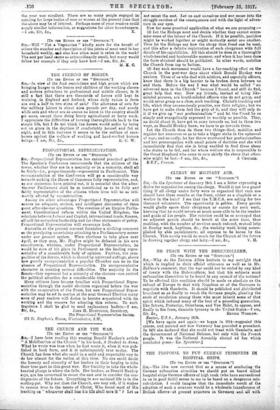THE CHURCH AND THE WAR.
(To THE EDITOR or THE "SPECTATOR.") ,Sts,—I have been reading this evening Donald Hankey's article " A Mobilisation of the Church " in his book, .4 Student in Arms. What be wrote was true when be first wrote it, when it was pub- lished in book form, and it is unfortunately true to-day. The Church Lae done what she could in a mild and respectable way to -do her utmost for the nation at this time. No one could doubt the honesty and sincerity of her leaders in their longing to take their true part in Chia great war. Her timidity to take the whole- hearted plunge is where she fails. Her leaders, as Donald Hanley says, are too concerned to count the-cost and to consider the con- Urgencies of the future. Everything, in our national life is in the melting-pot. Why not then the Church, one may ask, if it wishes to remain true to the tenets of Christ, Who., based most of His teaching on " whoeoever shell lose his Ufa shall save it "1 Let tuk
not count the cost. Let us east ourselves and our. cause into the struggle careless of the consequences and with the light of adven- ture in our eyes.
Now for some practical application of what we are proposing :-
(1) Let the Bishops meet and decide whether they cannot econo- mize some of the labour of the Church. Mt be possible, parishes might be worked together or might mutually assist one another. Then let the Bishops say how the clergy thus freed can be need, and this after a definite registration of each clergyman with full details of his caPabilities. All this should be done in a thoroughly whole-hearted and businesslike manner, and when it has been dons the facts obtained should be publiehed. In other words, mobilize the Church from top to bottom.
(2) Any such movement would have a far-reaching effect on the Church in the post-war days about which Donald. Ilankey was anxious. Those of us who deal with soldiers, and especially officers, know that there is a big barrier to be broken down between us and them. Before the war I was what would be called " an advanced man in the Church " because I found, and still do find, great help that way. Now my friends, instead of being like- minded parsons, aro broad-minded officers who do not grasp, and would never grasp as a class, such teaching. Christ!e teaching and life, which they uneonscionsly practise, are their religion; but we have got to make them feel the grip of it, and they will only do it if we give up," our professionalism " and let the Creed be as simply and evangelically expressed in worship as possible. They, no doubt about it, have got to come towards us, but in these two wayseas Donald Hankey knew, we have to go towards them.
Let the Church then do these two things—first, mobilize and register her resources so as to take a bigger stake in the upheaval of war; and secondly, let her throw ovorboard her professionalism and her preoccupation with small points of doctrine and she will immediately End that she is being enabled to feed those eheep who desire to be fed, and for whose welfare she is responsible to the Great Shepherd who minis to save chiefly the sheep that other- wise might be lost.—I am, Sir, Lc., A Cieteuseg. B.E.F., France.


































 Previous page
Previous page